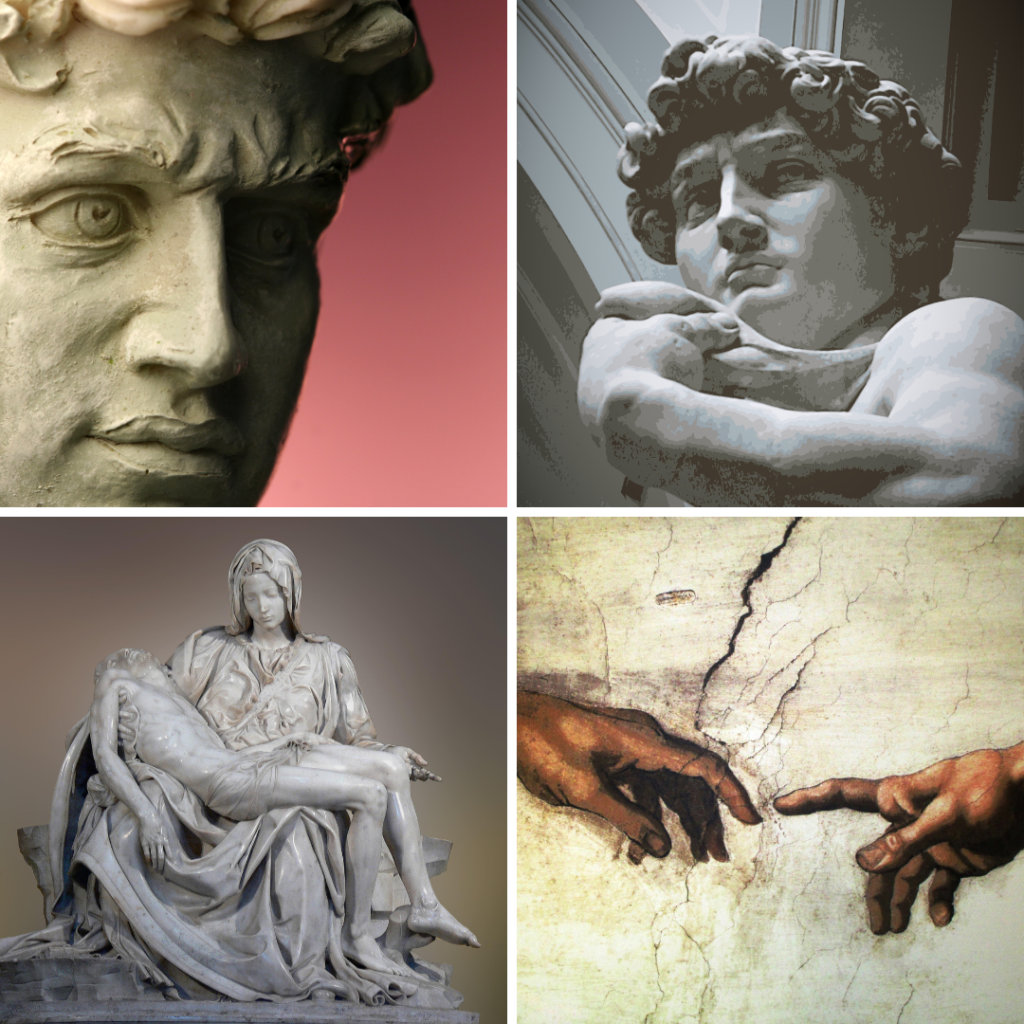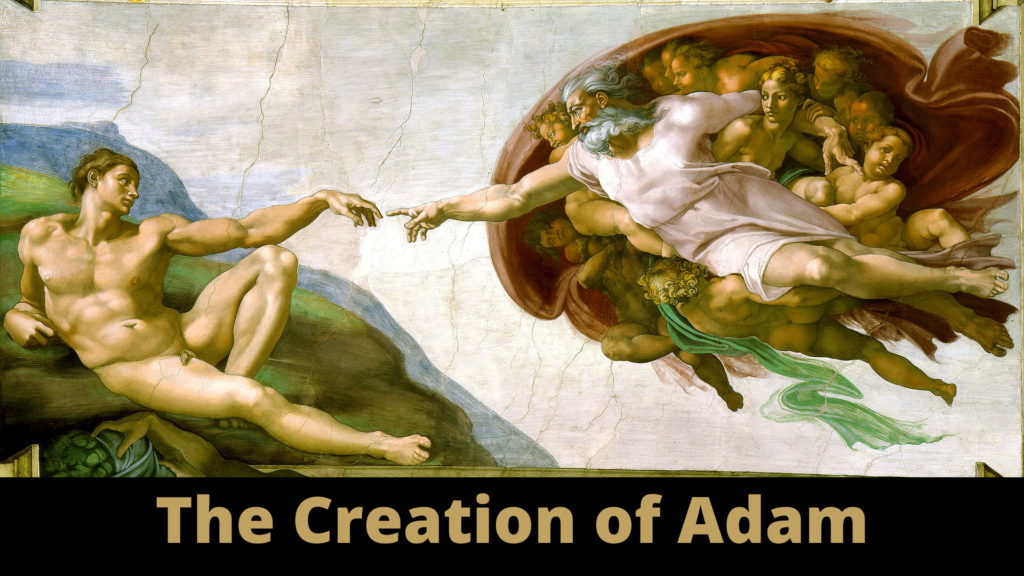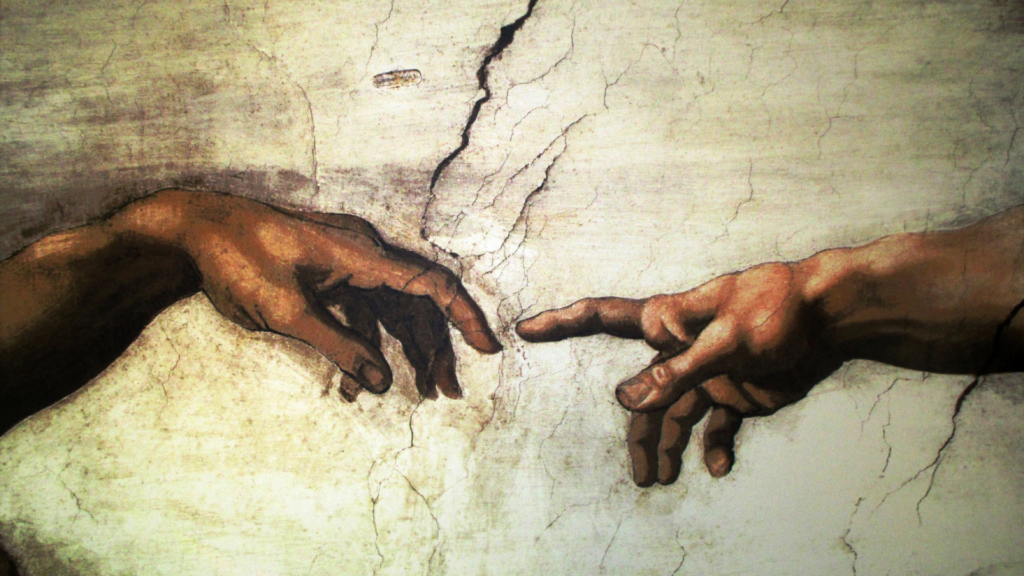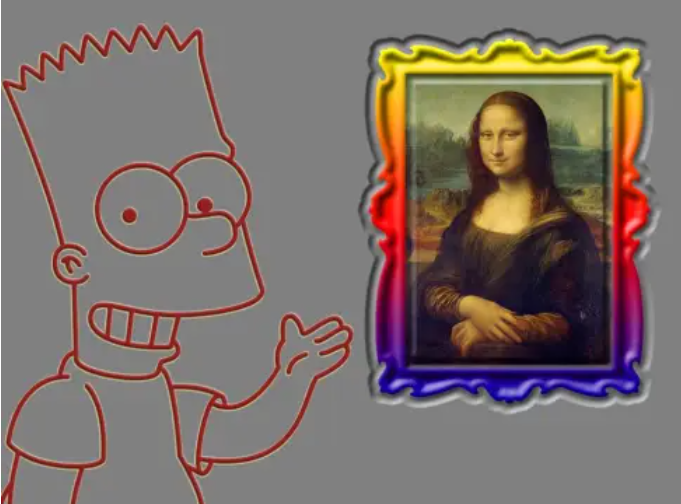
“I saw the angel in the marble and carved
until I set him free”
– Michelangelo –
In the above words, Michelangelo has described how intuition helped him sculpt.
Michelangelo was a famous artist during the Italian Renaissance. He was commissioned by Pope Julius II to paint the ceiling of the Sistine Chapel between the years 1508 and 1512.
“The Sistine Chapel … is a chapel in the Apostolic Palace, in Vatican City and the official residence of the pope. … Today, it is the site of the papal conclave, the process by which a new pope is selected. The fame of the Sistine Chapel lies mainly in the frescoes that decorate the interior, most particularly the Sistine Chapel ceiling and The Last Judgment, both by Michelangelo.” Wikipedia
The Creation of Adam is one of the frescoes that Michelangelo painted on the ceiling of the Sistine Chapel.

The Creation of Adam focuses on the power of God which is so very strong that it was not necessary for the fingers of Adam and God to touch. The power of God was strong enough to reach across the gap between the fingers of God and man.

Annie Dillard has told us that the good stuff lies in the gaps:
Go up into the gaps. If you can find them; they shift and vanish too. Stalk the gaps. Squeak into a gap in the soil, turn, and unlock-more than a maple- a universe. This is how you spend this afternoon, and tomorrow morning, and tomorrow afternoon. Spend the afternoon. You can’t take it with you.”
― Annie Dillard, Pilgrim at Tinker Creek
Intuition lies in the gaps. Because it is a type of formless stuff that is almost hiding in the gaps, it is hard to define, but I’ll make a stab at it. Intuition is a driving force that is buried somewhere within an individual, and when a creator allows it to do so, intuition can help the artist make decisions as he creates. This internal force works for all types of artists–be they painters, writers, or songwriters.
David Foster wrote the song “The Prayer.” In the following video, He talks about how his intuition wrote that incredible song:
“…all of those melodies are swirling around in the universe, and the best songs come through you and not from you….The song comes when the feeling can’t be said without it.” – David Foster, Composer
When I am painting and when I am writing, I consider it a great day when something within myself takes over and essentially completes my project for me. This gentle urging is intuition. It is the spark that helped Michelangelo release his sculptures from a piece of rock, and it is my writer’s voice and also the force behind my painter’s style.

Bouquet in a Blue Jar – Jacki Kellum Watercolor Painting
When people comment on my paintings, they most often speak about my bold use of color and the bravery that they see within my marks. When people comment upon the bravery that I exhibit when I paint, however, I must correct them. I am not the brave participant in my paintings. My intuition is. When I am having a good painting day, an inward force literally takes control of my hand and it urges my hand to dip into a little more red and to slash it here or to place a little pink there, or to blob more blue somewhere else. My only courage is to allow my intuition to take control. Often, even I am surprised by what my intuition has painted. The same force drives me when I write.

“I don’t know! I don’t know why I did it, I don’t know why I enjoyed it,
and I don’t know why I’ll do it again!”
– Bart Simpson –
In his book about writing, Zen in the Art of Writing, Ray Bradbury said that his own writing began to improve when he allowed his stories to write themselves. He said that early in his career he began collecting lists of nouns that he felt could be a prompt for a future story:
I began to run through those lists, pick a noun, and then sit down to write a long prose-poem-essay on it.
Somewhere along about the middle of the page, or perhaps on the second page, the prose poem would turn into a story. Which is to say that a character suddenly appeared and said, “That’s me”; or, “That’s an idea I like!” And the character would then finish the tale for me.
It began to be obvious that I was learning from my lists of nouns, and that I was further learning that my characters would do my work for me, if I let them alone….Bradbury, Zen in the Art of Writing, pg. 19.
Bradbury recalled that when he was a child, he would draw skeletons to scare his girl cousins. With the word “skeleton” as a prompt: “I fell into my typewriter with it and came up with a brand-new, absolutely original tale, which had been lurking under my skin since I first drew a skull and crossbones, aged six. I began to gain steam. The ideas came faster now, and all of
them from my lists.” – Bradbury, Zen in the Art of Writing, pg. 20.
“I listened to the middle-of-the-night locomotives wailing across the northern Illinois landscape, and that was death, a funeral train, taking my loved ones away to some far graveyard. I remembered five o’clock in the morning, predawn arrivals of Ringling Brothers, Barnum and Bailey, and all the animals parading by before sunrise, heading for the empty meadows where the great tents would rise like incredible mushrooms. I remembered Mr. Electrico and his traveling electric chair. I remembered Blackstone the Magician dancing magical handkerchiefs and vanishing elephants on my hometown stage.
– Bradbury, Zen in the Art of Writing, pgs. 20-21.
Bradbury assured us that EVERY person, not merely the creator, has an intuitive voice within himself:
As we can learn from every man or woman or child around us when, touched and moved, they tell of something they loved or hated this day, yesterday, or some other day long past. At a given moment, the fuse, after sputtering wetly, flares, and the fireworks begin.
Oh, it’s limping crude hard work for many, with language in their way. But I have heard farmers tell about their very first wheat crop on their first farm after moving from another state, and if it wasn’t Robert Frost talking, it was his cousin, five times removed. I have heard locomotive engineers talk about America in the tones of Thomas Wolfe who rode our country with his style as they ride it in their steel. I have heard mothers tell of the long night with their firstborn when they were afraid that they and the baby might die. And I have heard my grandmother speak of her first ball when she was seventeen. And they were all, when their souls grew warm, poets. If it seems I’ve come the long way around, perhaps I have. But I wanted to show what we all have in us, that it has always been here, and so few of us bother to notice. When people ask me
where I get my ideas, I laugh. How strange—we’re so busy looking out, to find ways and means, we forget to look in. – The Muse, to belabor the point then, is there, a fantastic storehouse, our complete being. All that is most original lies waiting for us to summon it forth. – Bradbury, Zen in the Art of Writing, pgs. 34-35.
Bradbury calls this intuitive force “the Muse,”
“The Muse, to belabor the point then, is there, a fantastic storehouse, our complete being. All that is most original lies waiting for us to summon it forth.” – Bradbury, Zen in the Art of Writing, pg. 35.
Bradbury adds that this intuitive muse is fragile and that many people lost their access to their own intuitions long ago:
We know how fragile is the pattern woven by our fathers or uncles or friends, who can have their moment destroyed by a wrong word, a slammed door, or a passing fire-wagon. So, too, embarrassment, self-consciousness, remembered criticisms, can stifle the average person so that less and less in his lifetime can he open himself out. – Bradbury, Zen in the Art of Writing, pg. 36.
While creating, a creator is often clueless about what drives him to make one mark here or another blotch there. The writer is similarly clueless about what is urging himself or herself forward. When I am having a good writing day, however, the words begin to write themselves. But in order for my intuition to take the wheel when I work, I must truly focus, and I must allow myself to become absolutely mindful and present.
The good news is that everyone has intuition. Many people have denied their intuitions for such a long time that they will have trouble accessing it again, but it is there. The first step to accessing one’s intuition is by Seeing and not merely Looking. Seeing is an active process. It requires physical engagement. It requires watching with a thinker’s eye:
Joan Didion has said that the magic of writing in in the gaps, and that is where the intuition lies also:
Go up into the gaps. If you can find them; they shift and vanish too. Stalk the gaps. Squeak into a gap in the soil, turn, and unlock-more than a maple- a universe. This is how you spend this afternoon, and tomorrow morning, and tomorrow afternoon. Spend the afternoon. You can’t take it with you.”
― Annie Dillard, Pilgrim at Tinker Creek\
Ray Bradbury said that we can feed our minds to help us better navigate the fragile and often ephemeral intuition that lies within ourselves. First, he said that the writer should read a large quantity of poetry:
Read poetry every day of your life. Poetry is good because it flexes muscles you don’t use often enough. Poetry expands the senses and keeps them in prime condition. It keeps you aware of
your nose, your eye, your ear, your tongue, your hand. And, above all, poetry is compacted metaphor or simile. Such metaphors, like Japanese paper flowers, may expand outward into territories …. – Bradbury, Zen in the Art of Writing, pgs. 38-39.
Bradbury also stressed that we must never overlook the treasury that lies within our own memories:
Do not, for money, turn away from all the stuff you have collected in a lifetime.
Do not, for the vanity of intellectual publications, turn away from what you are—the material within you which makes you individual, and therefore indispensable to others.
To feed your Muse, then, you should always have been hungry about life since you were a child. If not, it is a little late to start. – Bradbury, Zen in the Art of Writing, pg. 42.
Like Julia Cameron, who came after him, Ray Bradbury stressed the importance of writing daily:
The Muse must have shape. You will write a thousand words a day for ten or twenty years in order to try to give it shape, to learn enough about grammar and story construction so that these become part of the Subconscious, without restraining or distorting the Muse. – Bradbury, Zen in the Art of Writing, pg. 42.
Like many other writers, Bradbury advocated that the aspiring writer read a lot of what other writers have written.
By living well, by observing as you live, by reading well and observing as you read, you have fed Your Most Original Self. By training yourself in writing, by repetitious exercise, imitation, good example, you have made a clean, well-lighted place to keep the Muse.You have given her, him, it, or whatever, room to turn around in. And through training, you have relaxed yourself enough not to stare discourteously when inspiration comes into the room. You have learned to go immediately to the typewriter and preserve the inspiration for all time by putting it on paper. – Bradbury, Zen in the Art of Writing, pgs. 42-43.
Bradbury also said that the writer must be passionate:
The loud, the passionate voice seems to please most. The voice upraised in conflict, the comparison of opposites. You have given her, him, it, or whatever, room to turn around in. And through training, you have relaxed yourself enough not to stare discourteously when inspiration comes into the room. You have learned to go immediately to the typewriter and preserve the inspiration for all time by putting it on paper. … At the exact moment when truth erupts, the subconscious changes from wastebasket file to angel writing in a book of gold. – Bradbury, Zen in the Art of Writing, pgs. 43-44.
Several years ago, I wrote a poem in which I tried to capture how I often access my intuition in that gap between sleep and awakening. The name of that poem is “On Silver Sheets, I Sail.” My best writing ideas come to me when I am awakening in the morning or after a long nap. The following poem describes the intuitive voice that comes to me upon awakening:

On Silver Sheets, I Sail
by Jacki Kellum
Just before I open my eyes
I float along the misty skies.
I reach, I feel the soft, white hair
and fairy wings that flutter there.
I listen, I hear the slumber song,
The angel band that plays along
My dreams are in my pillow-pail.
On silver sheets, I sail.
Discover more from Jacki Kellum
Subscribe to get the latest posts sent to your email.